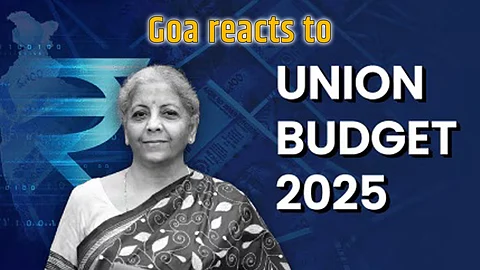

PANJIM: Goa Corporates have received the Nirmala Sitharaman presented Union Budget 2025-26 with a positive vibe. They highlighted the budget’s benefits for Goa’s tourism sector through Mudra loans for tourism-related projects and fisheries sectors. The increased IT exemption limit would boost investment and economic activity. The increased threshold limits for MSMEs, the rationalization of custom duties, and the removal of double taxation on transactions subjected to both TCS and TDS would benefit industry.
Shrinivas Dempo, President of the Goa Chamber of Commerce & Industry, has welcomed the Union Budget, stating it prioritizes growth while addressing cyclical concerns and laying the groundwork for long-term economic expansion. He highlighted the significant boosts to labour-intensive sectors like agriculture, MSME, footwear, and food processing. He expressed happiness that many of the Chambers suggestions such as Tax relief, rationalisation of TDS and boost to MSME have been accepted by the Hon’ble FM
Key highlights of the budget, according to Dempo, include:
- *Simplified Taxation*: A new Income Tax Bill aiming to simplify compliance and decriminalize taxation
- *Increased Thresholds*: Higher TDS and TCS thresholds to reduce compliance burdens
- *Reduced Litigation*: Measures to reduce litigation on transfer pricing issues
- *Presumptive Taxation*: A presumptive taxation regime for non-residents
- *Zero Income Tax*: No income tax up to ₹12 lakh (excluding capital gains)
GCCI Vice-President, Pratima Dhond, expressed her appreciation for the budget, highlighting its benefits for Goa’s tourism and fisheries sectors. She welcomed the enhanced credit guarantee limit from Rs 5 crore to Rs 10 crore, increased medical seats, and the expansion of district hospitals and cancer treatment centers. She emphasized that the decision to develop India’s top 10 tourism sites under private partnership would boost Goa’s infrastructure. She also welcomed the introduction of Mudra loans for tourism-related projects and the increase in the income tax exemption limit to Rs 12 lakh, which will greatly benefit lower- and middle-income groups. She noted that several of GCCI’s demands had been addressed in the budget.
GCCI Past President, Manguirish Pai Raikar, praised the budget for contributing to national development under the vision of ‘Viksit Bharat 2047.’ He highlighted that the increased IT exemption limit would boost investment and economic activity. He also lauded the government’s focus on agriculture, education, and innovation, emphasizing that the budget continues policies fostering a thriving business environment. He commended the Finance Minister for her commendable work.
GCCI Treasurer and Chairman of the Taxation & Financial Services Committee, Rohan Bhandare, noted that this was the eighth consecutive budget presented by the current Finance Minister and that people’s expectations were largely met. He welcomed the increased threshold limits for MSMEs, the rationalization of custom duties, and the removal of double taxation on transactions subjected to both TCS and TDS. He also pointed out that the revised IT limit would enhance consumer spending, positively impacting the economy.
Anirudh Dempo, President of GSIA, commended the government for exceeding expectations, particularly in personal income tax reforms, noting the increase from Rs 2.5 lakh in 2014 to Rs 12 lakh now. He welcomed the government’s focus on nuclear energy, acknowledging the strategic importance of diversifying energy sources beyond wind and solar. He also appreciated the attention given to social security measures, insurance, and healthcare.
Milind Shirodkar, Chairman of ICAI Goa, appreciated the budget’s focus on the four pillars of the economy—agriculture, MSMEs, investment, and infrastructure. He highlighted the MSME sector’s crucial role in national production and exports and welcomed performance-linked schemes incentivizing states to improve economic performance. He also praised the government’s approach of ‘Trust First & Scrutinize Later’ in personal taxation.
Kalpak Arware, President of VIA, welcomed the reduction in indirect tax rates and the removal of customs duties on several manufacturing equipment. He acknowledged the boost provided to exports and the resolution of the inverted duty structure, considering it a major win for the manufacturing sector.
Santosh Patil, President of AGTPA, described the budget as inclusive, covering all major sectors. He appreciated the increase in personal income tax exemption limits and anticipated further GST reforms, including addressing portal-related issues.
Pravin Dhapodkar, President of GSIC, called the budget forward-looking and mature, highlighting the extended gestation period for startups and its focus on sectors crucial to Goa’s economy.
Anwar Khan, Chairman of IEA Goa Region, praised the government’s continued investment in infrastructure, acknowledging the significant boost provided to various sectors.
Overall, the Union Budget 2025-26 has been well received by industry leaders in Goa, with expectations that it will drive economic growth, foster innovation, and enhance the business environment in the state and the country at large.